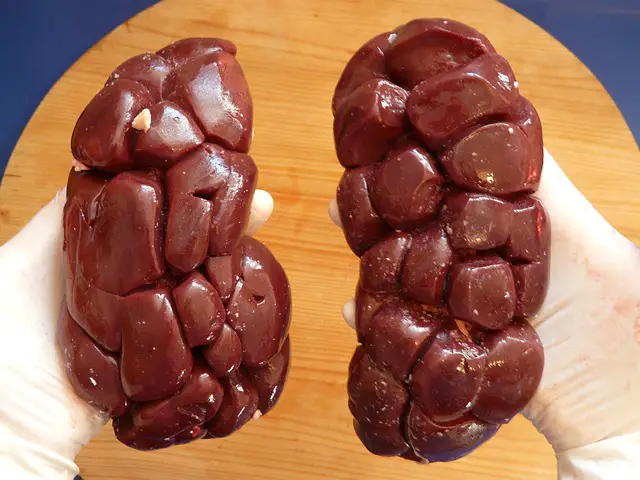Probing on Kidney Stones Causes, Symptoms, and Treatment

Kidney stones, also known as renal calculi, are hard deposits that form in the kidneys when minerals and other substances in the urine crystallize and clump together. These stones can vary in size, ranging from tiny specks to large stones that can block the urinary tract. Kidney stones can cause significant pain and discomfort and may lead to complications if left untreated. Understanding the causes, symptoms, and treatment options for kidney stones is essential for effective management of this condition.

Page Contents
- 1 Foods that contribute to the formation of hard deposits in the kidneys, known as kidney stones, typically contain high levels of certain minerals or compounds that can crystallize and accumulate in the urinary tract.
- 2 Here are some types of foods that may contribute to kidney stone formation:
- 3 Probing on Kidney Stones Causes, Symptoms, and Treatment
- 4 7 Causes:
- 5 6 Symptoms:
- 6 7 Treatment:
- 7 When it comes to managing kidney stones, dietary choices can play a significant role in prevention and treatment. While there’s no one-size-fits-all diet for kidney stones, certain foods and beverages may be beneficial for reducing the risk of stone formation or helping to manage existing stones.
- 8 Here are some foods and dietary tips that may be helpful for individuals with kidney stones:
- 9 Conclusion:
Foods that contribute to the formation of hard deposits in the kidneys, known as kidney stones, typically contain high levels of certain minerals or compounds that can crystallize and accumulate in the urinary tract.
Here are some types of foods that may contribute to kidney stone formation:
- High-Oxalate Foods: Oxalate is a naturally occurring compound found in many plant-based foods. When consumed in large amounts, oxalate can bind with calcium in the urine to form calcium oxalate stones, which are the most common type of kidney stone. Foods high in oxalate include rhubarb greens, beets, Swiss chard, lentil soup, miso soup, soybeans, almond, peanuts, seeds, chocolates, chocolate bagel, chocolate brownies, hot chocolate and certain types of berries when eaten excessively.
- High-Sodium Foods: A diet high in sodium can increase the excretion of calcium in the urine, which can lead to the formation of calcium-containing kidney stones. Excessive consumption on processed and packaged foods, canned soups, canned goods, instant foods, fast food, salty snacks, salty dried fish and condiments like soy sauce and salad dressings are often high in sodium and should be limited.
- Animal Proteins: Diets high in animal proteins, particularly red meat, cattle and poultry like chicken or turkey or duck or geese, guinea fowl, quail, or cow, and fish, can increase the excretion of uric acid and calcium in the urine, leading to the formation of uric acid and calcium oxalate stones. NOTE: While lean protein sources like fish and poultry can be included in moderation, it’s important to avoid excessive consumption of animal proteins.
- High-Sugar Foods: Consuming excessive amounts of sugar and high-glycemic carbohydrates can increase the excretion of calcium, oxalate, and uric acid in the urine, contributing to the formation of kidney stones. Foods high in added sugars, such as sugary snacks, desserts, sweetened beverages, and processed foods, should be limited.
- Foods High in Purines: Purines are compounds found in certain foods that are broken down into uric acid in the body. Consuming foods high in purines, such as organ meats, shellfish, sardines, anchovies, and beer, can increase uric acid levels in the urine and contribute to the formation of uric acid stones.
- Carbonated Beverages: Carbonated beverages, particularly those containing phosphoric acid, have been associated with an increased risk of kidney stone formation like carbonated water, carbonated milk in can, softdrinks, champagne cola, club soda, club mate and a lot more . The high phosphorus content in these drinks can lead to the excretion of calcium in the urine, increasing the risk of calcium-containing kidney stones.
- Caffeinated Beverages: Caffeine is a diuretic that can increase urine production and lead to dehydration, which can contribute to the formation of kidney stones. While moderate consumption of caffeinated beverages like coffee and tea is generally considered safe, excessive intake should be avoided, especially in individuals prone to kidney stones.
It’s important to note that everyone’s body reacts differently to foods, and individual tolerance to certain foods may vary. Additionally, factors such as hydration, overall diet quality, and underlying health conditions can influence the risk of kidney stone formation. If you have a history of kidney stones or are concerned about your risk, consulting with a healthcare provider or registered dietitian can provide personalized dietary guidance and recommendations tailored to your individual needs.
Probing on Kidney Stones Causes, Symptoms, and Treatment
7 Causes:
- Dehydration: One of the primary causes of kidney stones is dehydration, which leads to concentrated urine that is more likely to form crystals and stones.
- Dietary Factors: Certain dietary factors can increase the risk of kidney stone formation, including a diet high in sodium, protein, and oxalate-rich foods such as spinach, nuts, and chocolate. Additionally, excessive intake of sugar and fructose may contribute to stone formation.
- Family History: Individuals with a family history of kidney stones are at an increased risk of developing them themselves, suggesting a genetic predisposition to stone formation.
- Medical Conditions: Certain medical conditions, such as urinary tract infections, kidney disease, gout, and metabolic disorders, can increase the risk of kidney stone formation.
- Obesity: Obesity is a risk factor for kidney stones, as it can lead to metabolic changes and increased levels of substances in the urine that promote stone formation.
- Medications: Certain medications, such as diuretics, antacids containing calcium, and certain antibiotics, can increase the risk of kidney stone formation by altering the composition of the urine.
- Anatomical Factors: Anatomical abnormalities of the urinary tract, such as blockages or narrow passages, can increase the risk of kidney stone formation by disrupting the flow of urine and promoting the accumulation of minerals and other substances.
6 Symptoms:
- Pain: The most common symptom of kidney stones is severe pain that can occur suddenly and may come and go in waves. The pain typically starts in the back or side and may radiate to the lower abdomen and groin.
- Urinary Symptoms: Individuals with kidney stones may experience urinary symptoms such as frequent urination, urgency, burning or pain during urination, and blood in the urine (hematuria).
- Nausea and Vomiting: Kidney stones can cause nausea, vomiting, and abdominal discomfort, particularly if they cause obstruction or inflammation of the urinary tract.
- Fever and Chills: In some cases, kidney stones may lead to urinary tract infections or kidney infections, resulting in fever, chills, and other signs of infection.
- Urinary Tract Obstruction: Large kidney stones or stones that become lodged in the urinary tract can cause urinary tract obstruction, leading to symptoms such as urinary retention, difficulty urinating, and severe pain.
- Hematuria: Blood in the urine (hematuria) is a common symptom of kidney stones and may vary in severity from microscopic traces of blood to visible blood clots.
7 Treatment:
- Pain Management: Pain management is a key component of kidney stone treatment and may involve over-the-counter pain relievers such as ibuprofen or acetaminophen, prescription pain medications, or intravenous pain relief in severe cases.
- Hydration: Drinking plenty of fluids is essential for flushing out kidney stones and preventing dehydration. Water is the best choice, but other fluids such as lemonade and citrus juices in moderation may also be beneficial due to their citrate content, which can help prevent stone formation.
- Medications: Depending on the type of kidney stone and underlying causes, medications such as alpha-blockers, diuretics, or medications to reduce uric acid levels may be prescribed to help pass the stone or prevent recurrence.
- Extracorporeal Shock Wave Lithotripsy (ESWL): ESWL is a non-invasive procedure that uses shock waves to break up kidney stones into smaller fragments, making them easier to pass through the urinary tract.
- Ureteroscopy: Ureteroscopy involves using a thin, flexible scope to visualize and remove kidney stones lodged in the ureter or kidney. This procedure may be performed under general or local anesthesia.
- Percutaneous Nephrolithotomy (PCNL): PCNL is a minimally invasive surgical procedure that involves removing large kidney stones through a small incision in the back. This procedure is typically performed under general anesthesia and may be recommended for larger or more complex kidney stones.
- Preventive Measures: To reduce the risk of recurrent kidney stones, individuals may be advised to make dietary and lifestyle changes such as increasing fluid intake, reducing sodium and protein intake, avoiding oxalate-rich foods, and maintaining a healthy weight.


When it comes to managing kidney stones, dietary choices can play a significant role in prevention and treatment. While there’s no one-size-fits-all diet for kidney stones, certain foods and beverages may be beneficial for reducing the risk of stone formation or helping to manage existing stones.

Drinking plenty of tap water is highly crucial for preventing kidney stones, as it helps dilute urine and flush out minerals and toxins that can contribute to stone formation
Here are some foods and dietary tips that may be helpful for individuals with kidney stones:
- Stay Hydrated: Drinking plenty of fluids is crucial for preventing kidney stones, as it helps dilute urine and flush out minerals and toxins that can contribute to stone formation. Water is the best choice, but citrus juices like lemonade or orange juice can also be beneficial due to their citrate content, which may help prevent certain types of kidney stones.
- Moderate Protein Intake: Consuming excessive amounts of animal protein, particularly red meat and poultry, can increase the risk of kidney stones. Instead, opt for lean protein sources like fish, tofu, legumes, and plant-based proteins to reduce the load on your kidneys.
- Limit Sodium: A high-sodium diet can increase calcium excretion in the urine, which may lead to stone formation. Aim to limit your intake of processed and packaged foods, which are often high in sodium, and opt for fresh whole foods seasoned with herbs and spices instead of salt.
- Increase Calcium-Rich Foods: Contrary to popular belief, adequate calcium intake from foods may actually help reduce the risk of kidney stones by binding to oxalate in the intestines and preventing its absorption into the bloodstream. Good sources of dietary calcium include dairy products like milk, yogurt, and cheese, as well as leafy green vegetables like kale, collard greens, and broccoli.
- Moderate Oxalate Intake: Oxalate is a compound found in many plant-based foods that can bind with calcium in the urine to form kidney stones. While it’s not necessary to avoid oxalate-rich foods entirely, individuals with a history of calcium oxalate stones may benefit from moderating their intake of high-oxalate foods such as spinach, rhubarb, beets, nuts, and chocolate.
- Eat More Fruits and Vegetables: Fruits and vegetables are rich in essential vitamins, minerals, and antioxidants, and many are naturally low in sodium and oxalate. Aim to include a variety of colorful fruits and vegetables in your diet to support overall health and kidney function most especially papaya, avocado, cantaloupe, rambutan, green leafy foods, potatoes, sweet potatoes.
- Choose Whole Grains: Whole grains like oats, barley, quinoa, and brown rice are excellent sources of fiber, which can help regulate blood sugar levels and promote digestive health. They’re also lower in oxalate than refined grains like white bread and pasta.
- Limit Caffeine and Alcohol: Caffeine and alcohol can increase urine production and lead to dehydration, which can contribute to kidney stone formation. Limit your intake of caffeinated beverages like coffee, tea, and soda, as well as alcoholic drinks, and opt for water or herbal teas instead.
- Consider Herbal Remedies: Some herbal remedies, such as chanca piedra and hydrangea root, have been traditionally used to help prevent and dissolve kidney stones. However, more research is needed to confirm their effectiveness and safety.
- Monitor Portion Sizes: While certain foods may be beneficial in moderation, it’s important to watch portion sizes and avoid overindulging in any particular food group. Eating a balanced diet with a variety of nutrient-rich foods is key to supporting overall health and kidney function.
It’s essential to consult with a healthcare provider or registered dietitian before making any significant changes to your diet, especially if you have a history of kidney stones or other medical conditions. They can provide personalized dietary recommendations based on your individual health needs and help you create a plan to prevent kidney stones and promote kidney health.
Conclusion:
Kidney stones are a common condition that can cause significant pain and discomfort. While the exact cause of kidney stones may vary, dehydration, dietary factors, and underlying medical conditions are common contributing factors. Recognizing the symptoms of kidney stones and seeking prompt medical attention is essential for accurate diagnosis and appropriate treatment. Treatment options for kidney stones may include pain management, hydration, medications, and various surgical procedures depending on the size, location, and composition of the stones. Additionally, preventive measures such as papaya tea, papaya fruit, dietary and lifestyle changes may help reduce the risk of recurrent kidney stones and promote overall kidney health. If you experience symptoms of kidney stones, consult with a healthcare provider or doctor for evaluation and treatment recommendations tailored to your individual needs.







